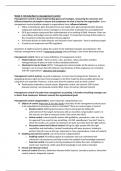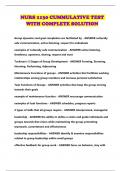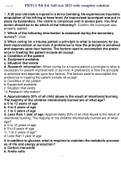Management control is about implementing goals and strategies, measuring the outcomes and
influence behaviors of people to ensure that employees do what is best for the organization. Some
management control problems people in organizations have; influence behavior
Police commissioner gives the police force one simple clear goal and decentralize decision
making and authority to senior managers to increase their motivation for accomplishment
Oil & gas company outsourced the redevelopment of an existing oil field. However, there are
many delays and budget overruns within the project. It’s important to keep all the parties in
the consortium motivated and their interests aligned
University decides to make diversity and inclusion more important > how to motivate people
A bank has to implement net IFRS regulation
Sometimes it might be good to adjust the system to the individual manager and employees. This
indicates management control is behavioral oriented and psychology is one of the theoretical areas
Management control: there are many definitions of management control
Malmi & Brown (2008): ‘Those systems, rules, practices, values and other activities
management put in place in order to direct employee behavior.’
Merchant & Van der Stede (2012): ‘Management control includes all the devices or systems
managers use to ensure that the behaviors and decisions of their employees are consistent
with the organization’s objectives and strategies.’
Management control systems: to guide employees’ or lower-level managements’ behavior, by
delegating decision rights to lower-level managers to let them make the best possible decisions by
using their own expertise. However, at the same time the systems want to retain control
Performance evaluation, reward system, diagnostic control, soft controls, ERP-system,
financial controls, non-financial controls (BSC), levers of control, informal controls
Management control is broader than management accounting, it includes everything managers use
to direct their employees’ behavior towards the organizational goals
Management control categorizations: some important categorizations are;
Objects of control (Merchant & Van der Stede): describes all the management controls used
in an organization by focusing on what is controlled? There are various types of control
o Results control; Defining performance criteria and targets by linking the
achievement of the targets to bonuses with an incentive compensation system. In
this way you are able to measure results (‘the carrot and stick’)
o Action control; control specific actions with guidelines, procedures, rules, etc. (ask
for approval if you want to buy something >€1.000, speedbump). You don’t have to
check the results, you create circumstances to make sure they have the right actions
o Personnel control and Cultural control; Hiring the right people with the right
capabilities and motivation, (mutual) monitoring with peer-pressure, training to
perform the job, tone-at-the-top. Important in many organizations. (code of conduct)
Enabling and coercive control: one of the newer categorizations
o Enabling control; Providing support to employees who are confronted with
unforeseen circumstances and help to solve the problem (use knowledge/expertise)
o Coercive control; Focused on forcing employees to follow the rules. Compliance is
much more important, while using their knowledge is not what is intended
Formal and informal control
Levers of control (Simons); distinction between belief systems, boundary systems, interactive
control systems, diagnostic systems
,Merchant & van der Stede (2007): there are 2 important
dimensions that determines which control system (results,
action, or personnel and cultural) to use; ability to measure
output and knowledge of the transformation process
(inputs > outputs to achieve the desired performance).
> Sales department; Cell 2 results control because it is
less clear what you need to do to sell the products.
> Production department; It depends on the type of
production department > mass-production has high knowledge (cell 1), while individual
tailor-made products are more difficult (cell 2); the measurability is high
> R&D department; Cell 4 personnel and cultural controls, because it is more difficult to
measure when R&D is doing well and how to get to this point. The numbers of research don’t
really matter, the content of the research is more important
> Finance: in the middle, it is less clear
It always depends on the type of production, department, and characteristics of the organization
Ouchi (1979): similar framework as Merchant & van der Stede, but he focuses on clan controls
instead of personnel and cultural controls
THERE IS NO SINGLE BEST MANAGEMENT CONTROL SYSTEM FOR EVERY ORGANIZATION!
Contingent approach to management control: it depends on the characteristics (contingent
factors/variables) of the department of the organization what is the best management control
system. A good management control systems enables the firm to better achieve its goals
Uncertainty of the environment, organizational culture, country culture, branch, strategy,
technology, transformation process, size
A business partner is interacting with management and benefits from the transformation process,
while controllers are the management accountants
Malmi, T., & Brown, D. A. (2008). Management control systems as a package—Opportunities,
challenges and research directions
Most people think a formal budget system is unsuitable in an uncertain environment. However,
many organizations also rely of formal budgets in uncertain environments. Even though you don’t
know what the sales, prices, etc. would be, which makes it much more difficult to budget
Create different scenarios; you have at least something to focus on (psychological
motivation)
Management control as a Package: Not only rely on formal budgets but also on information
communication makes it a valuable system and practice to use formal budget systems in an uncertain
environment. Combine open and flexible budgeting with communication by using the targets in a
more informal way in the discussion (use budgets formal and informal)
√ Management control systems do not operate in isolation; the management control system
elements invariably sit within a broader system/package, each of the systems do not operate
by themselves. It’s a combination of both, formal and informal management control systems
One of the challenges in management control is to know more about the elements within the
control package and how they relate to each other (large and complex packages). All the different
elements work together, and together they have a certain impact on performance!
Results controls in combination with soft controls > everything influences each other
,The form of the MCS package is influenced by functional issues rather than contingent factors
, Hall, M. (2010). Accounting information and managerial work.
‘The purpose of management accounting information is to provide information to assist managers in
their planning and control activities’
Managerial work: responding to the unusual, the ad hoc, and the unplanned, where problem
boundaries are typically hazy and unstable. It’s not about clear problems that need to be solved. For
the decisions you cannot predict, you need different management accounting information
Portfolio of problems; managers deal with problems that are all related. Most of the
information managers use is not for one specific decision, but to develop an understanding
of context and work environment in general
Information systems; management accounting information, formal information systems
Knowledge about work environement; general info
Interaction with others; the information is not only formal information, but also informal
information coming from memos, emails, etc., collected in an unstructured way. You give
meaning to information by interacting with other managers, employees,
colleagues, or other people outside the organizations. This helps to interpret
the related information to the decisions and problems > Data visualization
Implications;
Explicit acknowledgement of different roles of accounting information;
When you talk about management accounting information and developing management
accounting and control systems, it’s important to consider this information may have other
roles than only supporting specific decision; more general knowledge
The role of accounting information should be considered relative to other information; you
could also think about what the relative strength (aggregation of information of several
departments, business language) of accounting information is
The focus should be much more on how managers actually use the information. It’s not
only about producing information, it’s also about thinking what managers do with the
information and how it could help them given what their role is in the organization
Greater engagement between researchers and practitioners is necessary. You have to be
really interested in what managers do to be able to do research in this area
3 factors influence the usefulness of accounting information for developing knowledge of the work
environment: ‘closeness’ to operational activities, time horizon, and diversity of operational factors
under consideration.
- Accounting information is more helpful for knowledge development when a managers if
further to operational activities, the time horizon of the issue under consideration is longer ,
and the number of operational factors to consider is larger
- Accounting information is more likely to facilitate managers’ knowledge development when
it highlights the outcomes of key events, is structured around issues of managerial important,
is free of jargon and doesn’t decipher cause-and effect relations





